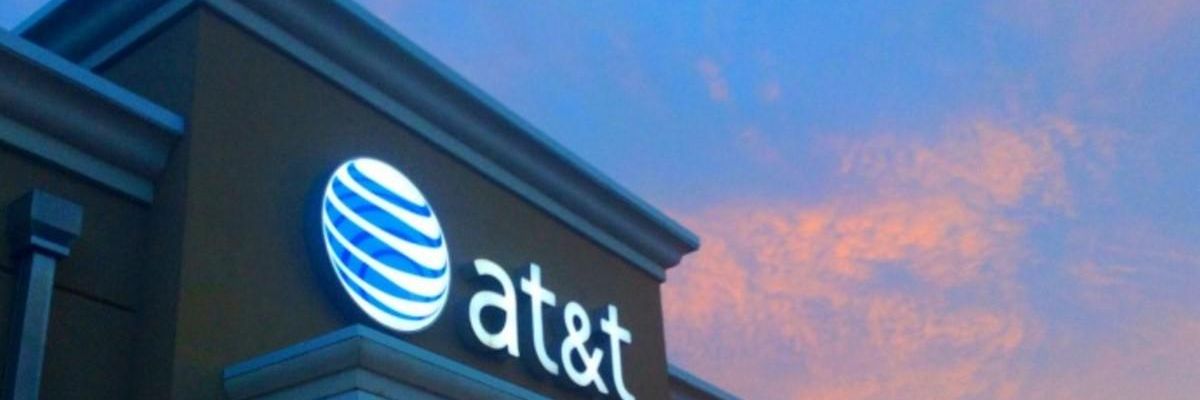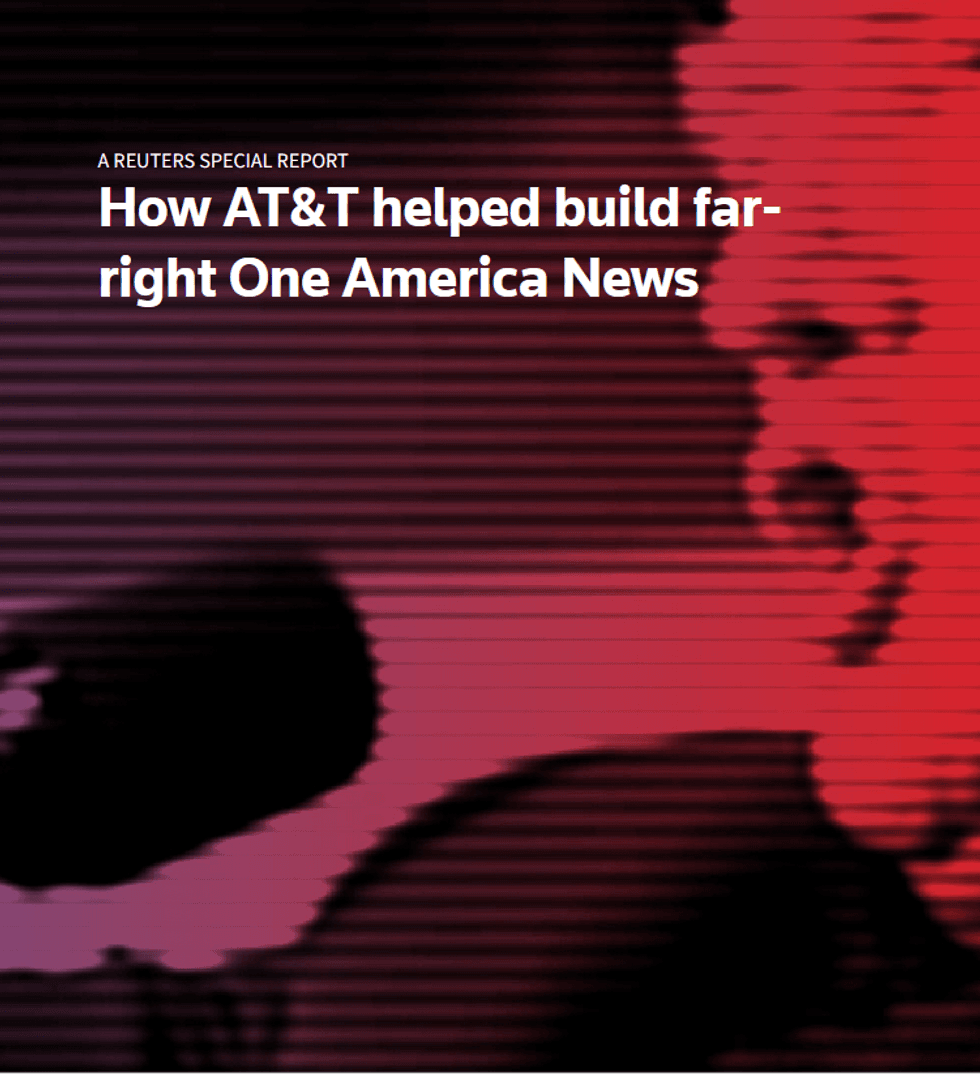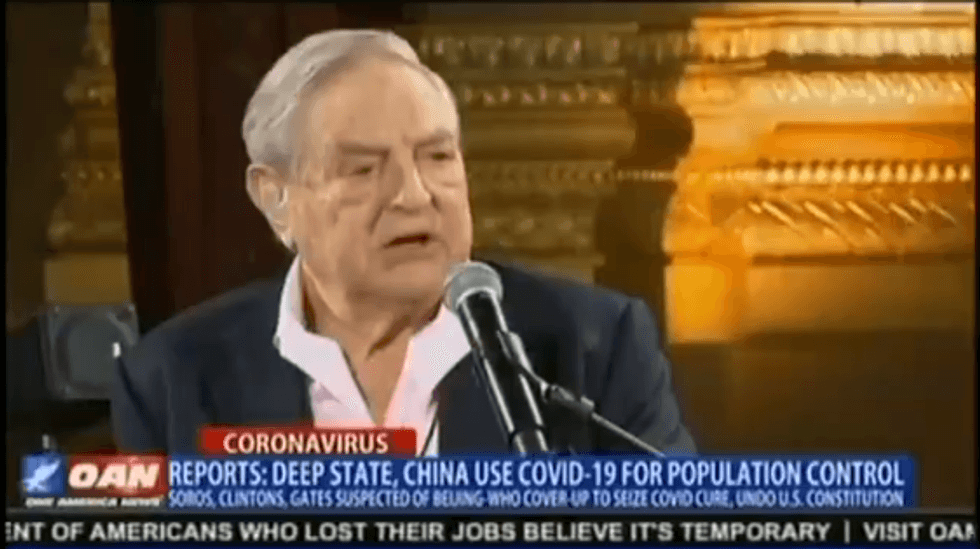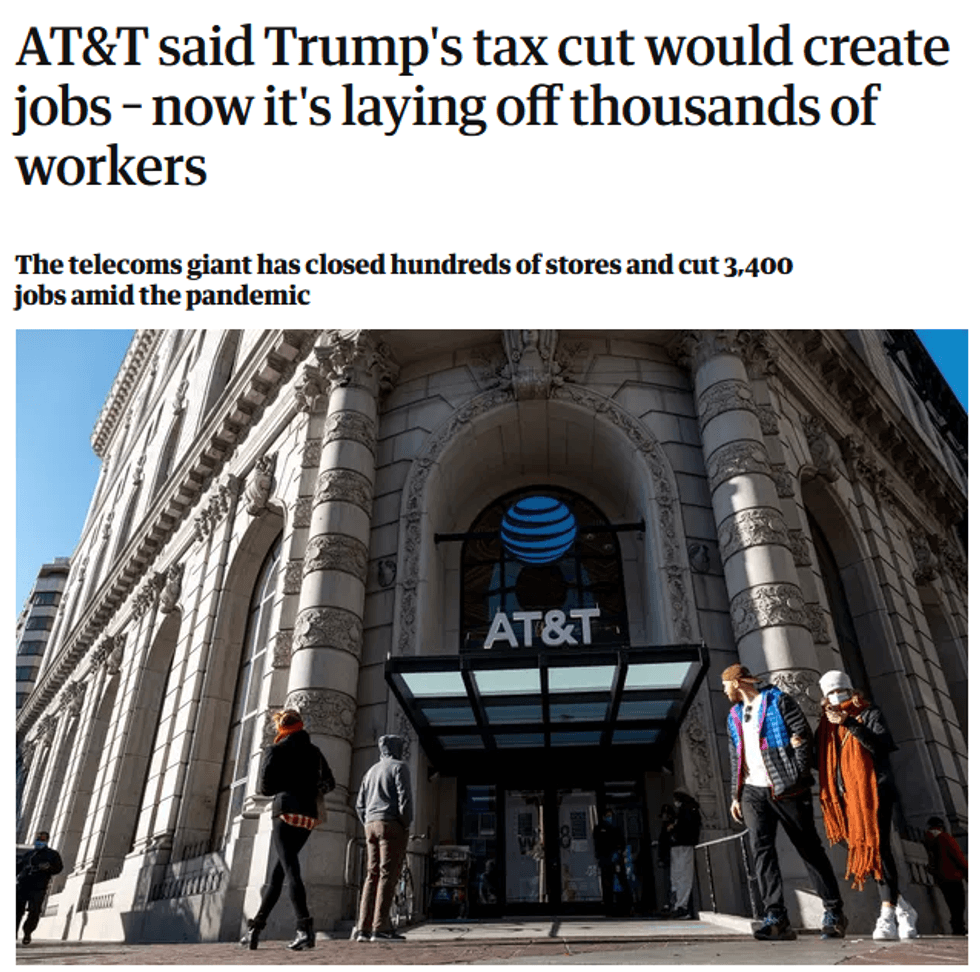A report linking AT&T, one of the US's most powerful telecommunications corporations, to the far-right One American News Network has been presented as a "bombshell" revelation (Daily Beast, 10/6/21; Poynter, 10/7/21; Guardian, 10/7/21) about the connection between big capital and Trumpian populism. The question is: Should it be so surprising?

Reuters (10/6/21) documented the symbiotic relationship between one of the US's most toxic far-right news outlets and its largest telecom company.
The first segment of the investigation by Reuters (10/6/21) found that "AT&T has been a crucial source of funds flowing into OAN, providing tens of millions of dollars in revenue," and that 90% of "OAN's revenue came from a contract with AT&T-owned television platforms." The second segment (10/7/21) focuses on the network's founder, Robert Herring Sr.
It's a remarkable piece of investigative business journalism by John Shiffman, scrutinizing documents that might have otherwise stayed in the shadows. According to a 2019 deposition obtained by Reuters, Herring said that the idea for OAN came from AT&T executives in 2013. Herring said "they wanted a conservative network" because "they only had one, which was Fox, and they had seven others on the other side." (Reuters glosses "other side" as meaning "left-wing," a label that does not credibly apply to any of the networks carried by AT&T's DirecTV platform.)
AT&T has tried to downplay the story, saying that it does not fund the network or control it, but as Media Matters (10/6/21) noted, that early funding gave the network a head start, and "OAN would not exist were it not for AT&T's financial support and distribution." As Reuters quoted an OAN lawyer, if the network were to "not be renewed on DirecTV, the company would go out of business tomorrow."
Political hyper-extremism
OAN, along with Christopher Ruddy's Newsmax, has become synonymous with Donald Trump's nationalist wing of the Republican Party. It exhibits a political hyper-extremism that has led some of Trump's more ardent supporters to view Fox News, two decades ago the lone wolf of conservative TV news, as too liberal (CNN, 11/12/20; Washington Post, 12/27/20). This would come as a shock to viewers of Sean Hannity and Tucker Carlson, popular Fox hosts who still carry water for the former president and his movement. The surrealism of this shift is palpable: Both networks could easily be mistaken for parodies of a dystopian future, networks that fuse the Orwellian nature of North Korean broadcasting with American kitsch.

OAN (5/8/20) makes George Soros the face of a "population control" conspiracy.
OAN has promoted conspiracy theories about the 2020 election, Syria and much else (Daily Beast, 12/26/19). It aired a bizarre and not-too-subtly antisemitic "story linking the coronavirus to George Soros and a 'population control' plot" (CNN, 5/10/20). FAIR founder Jeff Cohen said of OAN, "I watched this channel every day in December 2020 and January, when audience spiked," through March 2021, and saw a channel "that makes Fox News sound like Democracy Now!"
Its over-the-topness has boosted the upstart's standing on the right, and gained it a sizable following, thanks in large part to promotion from Trump himself (Guardian, 6/15/19). OAN doesn't participate in Nielsen ratings, but the network claims it "pulled in its highest ratings ever in 2020," with viewership growing "by more than 40% in the fourth quarter compared to the third quarter," Reuters (12/29/20) reported. The news service quoted OAN CEO Herring claiming that according to data from "a major pay TV provider in 70 markets...OAN ranked as the No. 4 national news network with those viewers."
But the Trumpier-than-thou act also lands these networks in trouble: Dominion, which makes voting systems, sued both OAN and Fox for spreading the false accusation that the company fixed the 2020 presidential election for Joe Biden (CNBC, 8/10/21). Newsmax, the other major right-wing TV news network, had been part of the same lawsuit with OAN, but was dropped after it issued an apology to Dominion and admitted it had no evidence for its fraud claims (Forbes, 4/30/21).
Hardly progressive
How could a respectable firm like AT&T--a cornerstone of global commerce--end up in a gang like this? The revelations about AT&T and OAN puncture the myth that Trumpian populism, isolationism and extreme nationalism are isolated to the fringes of Red State America, somehow distinct and divorced from the traditional Republican base of corporate leaders, who are otherwise worldly and enjoy cozy relationships with politicians of both major parties.
AT&T is hardly a progressive company. For example, the Dallas Morning News (3/23/21) reported that AT&T sent "thousands of dollars through its PAC to Republican groups with ties to members of Congress who objected to certifying President Joe Biden's victory on January 6," even though the company had said "it would no longer contribute to those members in the days after the Capitol riot." Pro-choice activists blasted the company "for backing Texas lawmakers who sponsored the new state law that effectively outlaws abortion after six weeks" (CNBC, 10/4/21).

As a corporation, AT&T has a keen interest in tax cuts (Guardian, 3/30/21) and deregulation--priorities that mesh well with the politics pushed by far-right outlets like OAN.
Like most smart capitalist firms, AT&T gives money to both Democrats and Republicans, but has a clear preference: According to Open Secrets, in the 2020 election cycle, the company's PACs gave $165,000 to Republican Party committees, and only $60,000 to Democratic committees.
The Communications Workers of America has complained that company downsizing resulted in a reduction in wages (Fierce Wireless, 4/26/21). The Guardian (3/30/21) reported that AT&T showed "keen support for a major corporate tax cut under Donald Trump," arguing that it would spur job growth, but this year "announced permanent closures of hundreds of retail stores around the US and laid off thousands of workers."
Like most telecom firms, the company is hostile toward regulation, as it "lied about California's net neutrality law...when it claimed the law requires AT&T to stop providing 'free data' to mobile customers" (Ars Technica, 3/18/21). The American Civil Liberties Union (7/9/21) added that AT&T's privileging DirecTV for its cellular customers "is almost a pure textbook example of why net neutrality rules were put into place."
Not only had the telecom giant been a huge backer of the campaign to end the FCC's net neutrality policy, but New York state investigators found that the company was a part of a coalition that "acted to give" Trump FCC chair Ajit Pai "'cover' to repeal the broadband regulations" (New York Times, 5/6/21). AT&T "funded an effort that yielded millions of fake comments supporting" the end of net neutrality, the Times reported, adding that "about 18 million of the 22 million comments sent to the FCC during the debate over the net neutrality rules were fake, the investigation found."
Political cynicism
Is it so shocking that a communications company with such a track record of political cynicism would grab an opportunity to get a slice of the ascendant far-right media pie? The revelations counter a well-manicured image that Trump-aligned media and his loyalists in Congress are somehow anti-establishment, a voice of the regular American rather than of the commercial elite (FAIR.org, 2/16/21).
This image doesn't hold up to scrutiny. For example, Christopher Ruddy, the CEO of Newsmax, holds a graduate degree from the London School of Economics, and has served as a fellow at Stanford University's Hoover Institution--not exactly the resume of a provincial anti-globalist. His network (8/31/21) has pushed mainstream corporate conservative media lines against labor unions.
The Federalist was founded by Ben Domenech, who despite positioning the outlet as an enemy of the Washington swamp (6/9/21) is married to Meghan McCain, the daughter of Trump-loathing late Sen. John McCain, herself a former host of the popular mainstream show The View (Variety, 9/26/21).
On the other side of the Atlantic Ocean, the parent company of the Daily Mail--a tabloid (10/28/20) that has painted Brexit as a British partner to Trumpism in a popular rebellion against the global establishment--is controlled by Jonathan Harmsworth, aka the 4th Viscount Rothermere, a literal aristocrat (Guardian, 12/18/16).
So-called right-wing populism is often cloaked in the image of anti-corporate rage--take the ongoing campaign of Sen. Josh Hawley (Stanford '02, Yale Law '06) against Silicon Valley, which paints tech giants as unrestrained enforcers of cultural liberalism (Washington Post, 8/29/19). But Trump loyalists in Congress and in the media share a common bond with traditional and mainstream conservatives and the business class. They all want to lower taxes, reduce regulations on business and curtail the power of organized labor.
AT&T saw something worthwhile in OAN, and can certainly tolerate a bit of right-wing quackery if it means having another media avenue to fight a class war against any kind of progressive economic and regulatory agenda.




